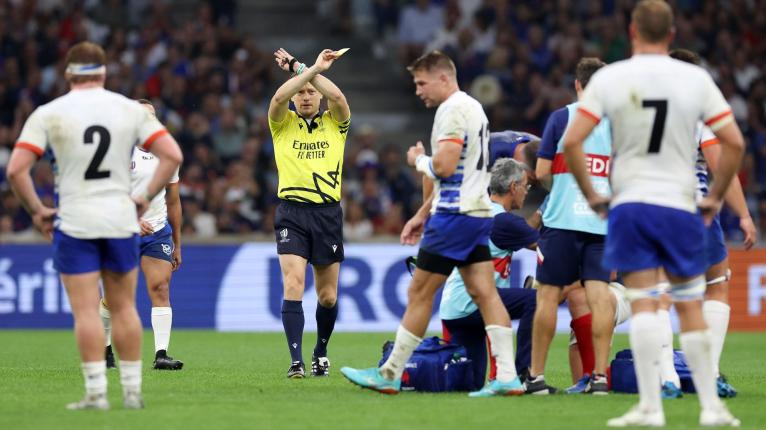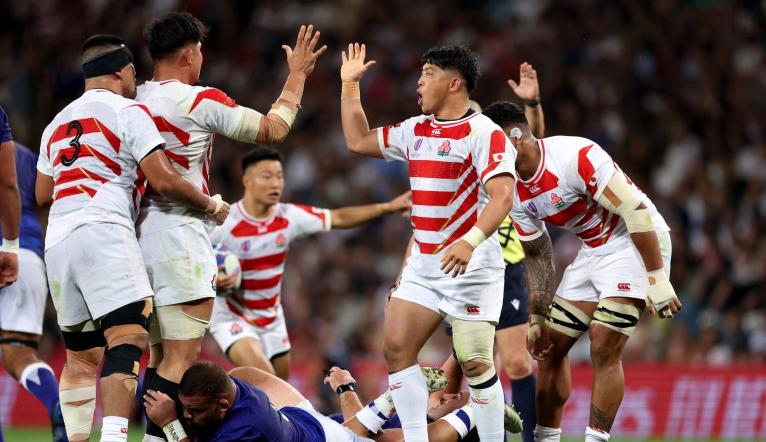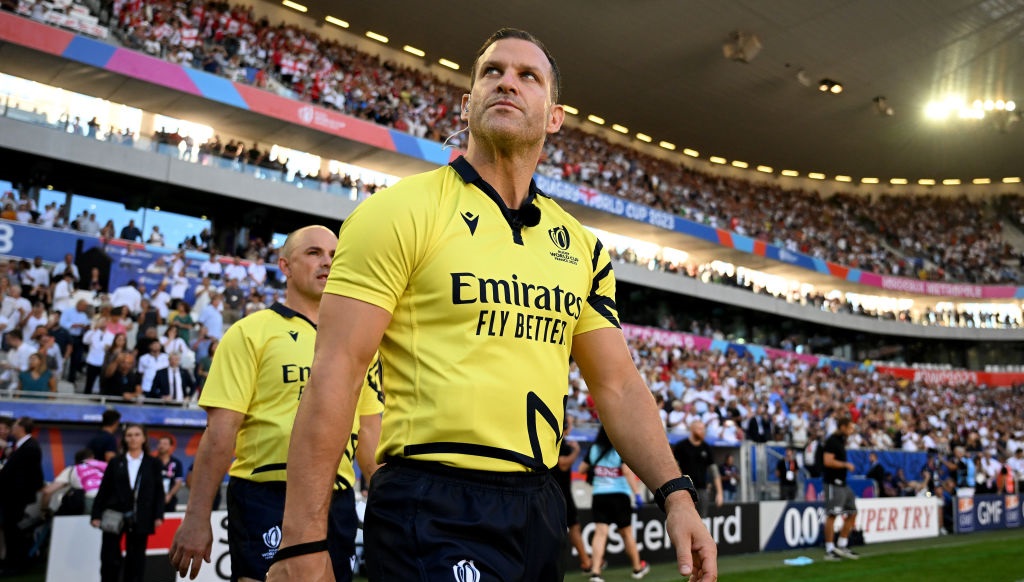Ref Watch: A little forward don't you think?

We probably all worked out fairly early in this World Cup that the question of head contact and everything that surrounds it would occupy plenty of column inches and create just as much social media angst.
What was less easy to anticipate was that the bunker system introduced on a trial basis over the summer then extended into our sport’s showpiece would quickly gain an array of such vocal critics.
And here’s the thing – as someone who has been involved in the sport for over 40 years as player, referee, touch judge and journalist I am completely unable to understand where they are coming from.
“Why doesn’t the referee just give a straight red card,” seems to be a regular response when a yellow card recipient for foul play has his case sent to the bunker for more careful examination.
Awarding a red card – the ultimate sanction – is not something that any team of match officials wants to get wrong.
As we have seen in top-level rugby across the globe since the TMO came into general use and the range of camera angles grew, the referee therefore considers every piece of available information and listens to any relevant opinion before going to his pocket.
Of course this takes time – perhaps three or four minutes on some occasions – which is why the bunker concept was introduced.
Where the officials are confident that the offence under consideration merits at least a yellow card they are in effect allowing the viewing public, either at the ground or via TV, to get on with watching the match while experts in the background assess whether yellow or red is an appropriate sanction.

Since there is an eight-minute deadline by which this call must be confirmed the on-pitch outcome is entirely unaffected.
It seems to me that critics of the bunker would either prefer a return to waiting while a decision is reached onfield or want the referee to make a hasty decision about which they would doubtless then comment on it being rushed and on occasions therefore wrong.
I can only assume that the critics’ beef is with the loss of dramatic effect as the referee brandishes a red card in the moment, but surely this is both irrelevant and a small price to pay for improved accuracy?
There is a real parallel here with cricket’s use of the third umpire when a batter reviews an onfield lbw or caught decision and the fielding side’s celebrations are halted until the outcome is confirmed. While the crowd are denied an instant hit of euphoria (or despair) ultimately the decision made with the support of technology is substantially more likely to be correct.
For those with short memories, a contest with perhaps three or four TMO reviews meant ‘the two-hour test match’ was a very real concern not that long ago. Following the introduction of the bunker that is a phrase of the past while the likelihood of a rushed, bungled red card has also been hugely reduced.
So in short it’s quicker and less prone to errors and surely therefore positive?
Managing Persistent Infringement
When Fiji narrowly failed to come from behind and ended up claiming two bonus points in a losing cause against Wales early in the competition, referee Matthew Carley received loads of criticism for his failure to issue a yellow card to the under-pressure victors for their concession of four consecutive penalties during the early stages of the fourth quarter.
As I explained at the time there were mitigating factors at work – although in fairness I suspect given his time again the English whistler would have reached for his pocket following the fourth penalty.
It has therefore been interesting to note that we have during the third week of games had two similar scenarios – neither of which drew cards.
Samoa conceded seven penalties in the third quarter of their defeat by Japan. Given that one of these was a ‘back ten’ for dissent and another ended as a red card via the bunker there was also no suggestion that these were blown for a range of trivial technical offences.

Instead, one scrum penalty apart, the remainder were typical of the sort of infringements committed by an under-pressure side struggling to keep a foothold in the game.
Experienced South African Jaco Peyper was the man in charge but he declined to up the ante to a card – and interestingly the fourth quarter subsequently brought a 3-2 penalty count against Japan, which suggests he had no need to use the sinbin in order to cut the infringements.
Similarly, Georgia were penalised six times by Karl Dickson in the opening 20 minutes of their defeat by Fiji. Four of these infringements came in the tackle area while the Lelos were also blown twice at scrums.
The English whistler also played a 21st minute penalty advantage against Georgia in their defensive ‘red zone’ before blowing a subsequent offence.
The penalty count over the final hour of this contest was six against Fiji and seven against Georgia – so again Dickson’s approach could be said to have worked.
There is nothing in law that ties the referee to giving a yellow card for repeated infringement – it is a management tool at his disposal when he/she feels penalties and warnings are not being heeded.
Like advantage it will therefore be used in slightly different ways at different times by different officials and while that sometimes leaves them open to criticism we should also recognise when their chosen approach works.
Forward pass ref?
Regular readers will possibly recall that I am less than impressed and more than a bit confused by the modern concept that allows nebulous factors like ‘momentum’ and ‘the direction of the hands’ to determine that passes which travel several metres forwards are deemed to have gone backwards.
The pass with which Anton Lienert-Brown released Mark Telea for New Zealand’s second opening night score against France and Cheslin Kolbe’s try for South Africa against Ireland are both firmly in this camp in my humble opinion as doubtless are many more.
With Dickson and touch judge Pierre Brousset impeccably positioned and level with play it was therefore perhaps surprising (or if you’re with me pleasing) to see Georgia no.8 Tornike Jalagonia’s marginally forward scoring pass to Akaki Tabutsadze blown up as it would have been 15 years ago.
A vote for sanity!
Barnes the Commentator?
Wayne Barnes may well join the freelance pundit community when his whistling days come to an end – on those occasions he has already been seen as a TV expert he has always impressed.
But based on the evidence of Scotland’s win over Romania might he also fancy a go at commentating?
The veteran English whistler provided a word-perfect summary of Ollie Smith’s second half try – which given that it featured a relatively unusual set of circumstances was extremely useful.
“Released the ball in the tackle, stood up, picked it up and scored,” Barnes prevented Miles Harrison from needing to tell us.
Precisely…






























































So two questions arise, and being a ref myself, they come form knowing there's so many things to look for, especially when you're a team of 1! But with a team of 4, surely clearly visible scrum, maul and ruck infringements should be blown for? e.g. Fra v Fiji, Fiji scrum on 5m line, Fra th clearly over-extended in front of ref and tj - should be seen and blown. Not doing so disadvantages Fiji. Secondly, so often hookers throwing in from inside fop and always ignored. Why? If materiality then how far inside is material, or why have the law?
Karl Dickson checking himself on the screen to make sure he is looking his best.
These refs nowadays.
Karl Dickson is the WORST of them all.
Georgia had advantage for a knock on; scrumhalf asked him to blow for the scrum - he INSISTED on them playing the ball.
Absolutely agree that the bunker system is a positive; and, to Mike's comment, yes, the Kerevi 'only a yellow card' did nothing to counter the folks who don't like the system; that was red card all day long (and it didn't really need a bunker review)
Just what does a wallaby have to do to warrant a red card? Take a machete onto the field with him?
It might be time to remind international referees that an offside player is still offside even if he is an all black. A high tackle is still high even if the tackler is English, a forward pass is still forward even when the passer is a springbok or a wallaby and if an "offload" goes forward it is still a forward pass.
All that aside, if a player is carded for a head to head contact, shouldn't the victim automatically have a head injury assessment?
I'm glad you brought up Cheslin Kolbe’s try for South Africa. Given that it travelled 3-4m forward (no one can deny that) I am surprised that the ref didn't look at it. As far as I could make out it was definitely a forward pass.
It is virtually impossible to pass the ball "backwards" as described here while you are running forwards, and the longer the pass the more it can drift forward with momentum.
How does the author of an article on a rugby website not understand the basic physics of passing a rugby ball, and why policing a forward pass based on where it is passed to where it lands would mean you could only pass the ball while stationary?
If you are running anywhere near full pace, and throw the ball directly behind you above your head as hard as you can it will still land ahead of where you passed it!
EVERY pass you see in a game thrown by someone who is running forwards goes forward from the point it is passed. EVERY pass.